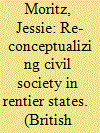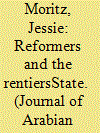|
|
|
Sort Order |
|
|
|
Items / Page
|
|
|
|
|
|
|
| Srl | Item |
| 1 |
ID:
179807


|
|
|
|
|
| Summary/Abstract |
Studies of the Middle East following the Arab Spring have concluded that ‘repression works’, especially in the oil- and gas-rich countries of the Gulf. Drawing on primary materials collected during fieldwork trips to Bahrain, the United States and Britain, this article nuances the ‘repression effect’ by tracing the emergence of a transnational Bahraini opposition, mapping the relationships and joint activities between domestic and exiled Bahraini groups, international NGOs and western policy-makers. It finds that even in the context of domestic repression and continuing ideological divides within Bahrain's opposition, transnational networks have not only sustained opposition organizations, but also maintained access to foreign policy-makers, producing repeated criticisms of the Bahraini regime and legal challenges to ruling elites who visit western states. The successes of this advocacy are modest: while it has not drastically reshaped the domestic state–society relationship, it has created significant costs for the Bahraini regime and damaged Bahrain's international brand. As a result, state and opposition networks now compete for influence over western policy-makers: international ‘arenas of advocacy’—such as the UK parliament, US Congress, UNHRC and European Parliament—have now become ‘arenas of contestation’, as state and opposition narratives of Bahraini politics, filtered through western policy-makers, play out during debates over foreign policy towards Bahrain. The article positions transnational activism as a direct outcome of the ‘repression effect’, highlighting ongoing contests for influence between state and society occurring in international and transnational spaces, even as the domestic scope for opposition mobilization remains highly restricted.
|
|
|
|
|
|
|
|
|
|
|
|
|
|
|
|
| 2 |
ID:
171905


|
|
|
|
|
| Summary/Abstract |
Civil society is typically understood as weak or irrelevant in Gulf rentier states, the assumption being that rent-derived wealth allows the state to co-opt or repress associational life. However, for all these claims about the relationship between rents and civil society, rentier state theory relies on a number of assumptions regarding the nature of civil society itself, specifically that civil society is, by definition, independent of the state, formal and public in organization, and pro-democratic in orientation. This article examines where relaxation of these assumptions allows us to better understand the political activities of civil society groups in Gulf rentier states, even as co-optative and repressive governance tactics continue to limit space for political activity. Instead of focusing on traditional forms of civil society, we should instead search for those parts of Gulf society that fulfil the function of civil society in terms of societal entities that act collectively to pursue a political purpose (including both engagement with the state over policy matters and debates on moral and social societal norms).
|
|
|
|
|
|
|
|
|
|
|
|
|
|
|
|
| 3 |
ID:
163235


|
|
|
|
|
| Summary/Abstract |
The oil and gas-rich states of the Gulf Cooperation Council have long been treated as exceptional, where distributions of rent-based wealth to society assumedly preclude political dissent. Yet, by examining informal and formal opposition in Qatar, Bahrain, and Oman since 2011, this article disputes the effectiveness of this “co-optation mechanism” at the sub-national level. Drawing from 135 semi-structured interviews conducted with citizens of these states, it uncovers evidence of challenges to state authority even among nationals who should theoretically be co-opted. In examining the limits of rent-based co-optation, the article highlights two key political dynamics that have demonstrated a capacity to overpower rent-based incentives to remain politically inactive: ideology and repression. Societies, then, were far from quiescent, and this research examines the networks and dynamics that have allowed citizens to challenge state authority.
|
|
|
|
|
|
|
|
|
|
|
|
|
|
|
|
|
|
|
|
|